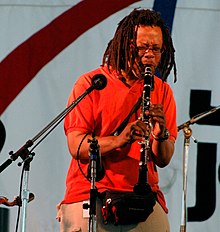Don Byron
| Don Byron | |
|---|---|

Photo by Ed Newman
|
|
| Background information | |
| Birth name | Donald Byron |
| Born | November 8, 1958 |
| Origin | New York, United States |
| Genres |
Avant-garde jazz Post bop M-Base Klezmer |
| Instruments |
Clarinet Bass Clarinet Saxophone |
| Years active | 1980s–present |
| Labels |
Nonesuch/Elektra Records Blue Note/EMI Records |
| Associated acts |
Hankus Netsky M-Base Collective |
Donald Byron (born November 8, 1958) is an American composer and multi-instrumentalist. He primarily plays clarinet, but has also used bass clarinet and saxophones.
Though rooted in jazz, Byron's music is stylistically eclectic. He has worked in many different musical genres, ranging from klezmer music and German lieder, to Raymond Scott's "cartoon-jazz," hard rock/metal, and rap. Most of Byron's albums have been conceptual, devoted to works of a particular musician and/or style of music.
Byron was born in The Bronx, in New York City. Both parents were musicians: his mother was a pianist and his father played bass in calypso bands. As well as listening to jazz recordings by Dizzy Gillespie, Miles Davis and others, he was exposed to other styles through trips to the ballet and symphony concerts.
He studied clarinet with Joe Allard and studied music at the New England Conservatory in Boston with George Russell. While in Boston, Byron performed and recorded with the Klezmer Conservatory Band, founded by NEC faculty member Hankus Netsky.
Byron is a gifted performer on clarinet, bass clarinet and saxophone, but on many of his albums he subordinates his own playing to the exploration of a particular style. Byron is representative of a new generation of conservatory-trained jazz musicians who explore and record in a rich array of styles; his first album, Tuskegee Experiments, is a stew of classical avant garde and jazz improvisation, while albums such as Ivey Divey represent a straight-ahead exploration of the traditional jazz 'tune'.
...
Wikipedia
